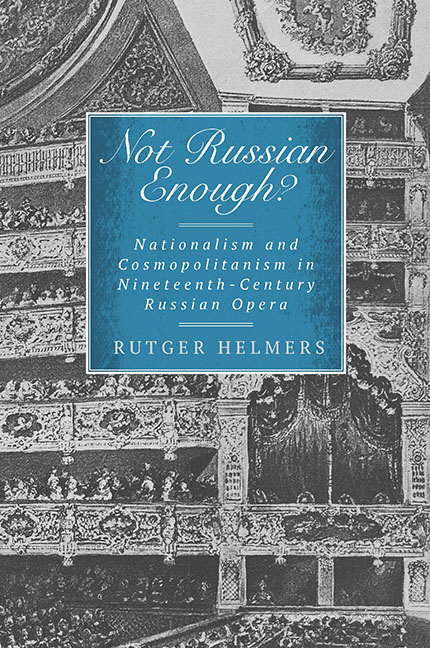Book contents
- Frontmatter
- Dedication
- Contents
- List of Illustrations
- Acknowledgments
- Editorial Notes
- Introduction: The Part and the Whole
- A Life for the Tsar and Bel Canto Opera
- Subject Matter, Local Color, and National Style in Judith
- French Theatricality and Inadvertent Russianisms in The Maid of Orléans
- The Tsar's Bride and the Dilemma of History
- Conclusion
- Abbreviations
- Notes
- Bibliography
- Index
A Life for the Tsar and Bel Canto Opera
Published online by Cambridge University Press: 15 March 2018
- Frontmatter
- Dedication
- Contents
- List of Illustrations
- Acknowledgments
- Editorial Notes
- Introduction: The Part and the Whole
- A Life for the Tsar and Bel Canto Opera
- Subject Matter, Local Color, and National Style in Judith
- French Theatricality and Inadvertent Russianisms in The Maid of Orléans
- The Tsar's Bride and the Dilemma of History
- Conclusion
- Abbreviations
- Notes
- Bibliography
- Index
Summary
It may seem a curious choice to begin a book entitled Not Russian Enough? with one of the cornerstones of the Russian national repertoire. After all, it was A Life for the Tsar that established Glinka's reputation as a national Russian composer, and in Western scholarship, the opera has been studied almost exclusively from the perspective of nationalism. There is little doubt that the subject was nationalist, and, as other scholars have shown, perfectly represents Nicholas I's state ideology of Official Nationalism. Glinka's friends, moreover, were quick to present A Life for the Tsar as a watershed in the history of Russian music after its premiere in November 1836: the writer, thinker, and music enthusiast Prince Vladimir Odoyevsky saw nothing less than “the dawn of a new age in the history of the arts—the age of Russian music,” and the journalist Yanuary Neverov stressed that, unlike earlier attempts, A Life for the Tsar was a “purely Russian, national, native work.” A relative bystander like Nikolay Gogol’, too, pronounced the opera “a wonderful new beginning,” opening vistas of an even greater operatic future founded on the vast resources of Russian and Ukrainian folk music. It did not take long before A Life for the Tsar was widely considered the first truly Russian opera, at the expense of all its predecessors and contemporaries.
But there has also been another side to the reception of Glinka's first opera. Take, for instance, the following explanation of why A Life for the Tsar was in fact “recognized as a good opera, and Glinka as a notable Russian composer” in the Sanktpeterburgskiya vedomosti (Saint Petersburg Gazette) of March 16, 1866:
First, because of the patriotic subject; secondly (and even more so), for everything in the opera that was weak. One only has to recall which places in the opera always made the greatest impression. Only everything that was concert-like, Italian, sentimental, and whiny [plaksivïy] was acknowledged as beautiful and original (for instance, the trio “Ne tomi, rodimïy,” the arias of Vanya, Antonida, and similar pieces that contain only negative qualities); these things have always pleased more than anything else, general attention was fixed only on them, and it is to them the opera owes its great success… .
- Type
- Chapter
- Information
- Not Russian Enough?Nationalism and Cosmopolitanism in Nineteenth-Century Russian Opera, pp. 20 - 49Publisher: Boydell & BrewerPrint publication year: 2014



